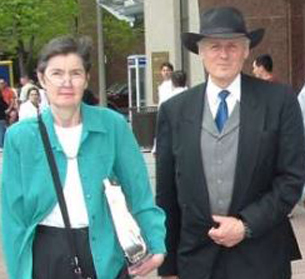
Reflections on Vancouver, British Columbia and other topics, related or not
The establishment
doth protest too much
Even in death Barbara Kulaszka and Doug Christie
present reproachful examples to Canada’s faux activists
Greg Klein | July 23, 2017
Barbara Kulaszka and Doug Christie outside
a Canadian Human Rights tribunal in 2007.
It took a campaign of cheap vilification to publicize the death of Barbara Kulaszka. Her passing last month at the age of 64 went largely unnoticed until media learned that a group of supporters had (horrors!) rented a Toronto public library meeting room to hold a memorial. Then came the publicity, punctuated repeatedly with emotive garbage about “hate” and “Nazis.”
Kulaszka had apparently retired quietly some years earlier. But her career featured some accomplishments vital to democracy, as she defended the right not only to express opinions but to state facts. Courage consistently distinguished her work. She stood up to powerful interests, apparently undeflected by regular vilification of the kind that broke out anew over the library meeting.
Self-sacrifice like hers is rare in Canadian history. Like her late colleague Doug Christie, even in death she stands as a reproach to those of us who’ve done so little, even more to those who cozy up to power while pretending to take a brave stand. Some of them, in stark contrast to these two exemplary figures, chose sides that boosted their material well-being.
It was the latter people who by far dominated the recent media coverage. Of several accounts I’ve read, only the National Post discussed Kulaszka’s work with any objectivity. And the somewhat error-ridden story buried that section between expressions of largely emotional bullshit, some of which the NP reported as fact.
Most journalists deferentially devoted most of their coverage to comments from the likes of Richard Warman, Bernie Farber and Warren Kinsella, three characters much more deserving of critical media scrutiny themselves.
But what can you expect of journalists? Most of them are too conventional to question the status quo that these people represent. A few might recognize the cheap rhetoric, double standards and craven opportunism. But even fewer would let such risky thoughts threaten their careers.
Of course it was inevitable that Kulaszka and Christie would run afoul of influential Jewish organizations. Those groups did themselves a disservice by taking the stand that they did, although in doing so they probably just revealed their true colours. But they don’t represent all Jews, as the example of Ezra Levant shows so valiantly.
As Muslim immigration increases, this country could host some individuals and groups far more worrisome to Jewish organizations and their suck-ups than free speech advocates have ever been. But, by virtue of being mostly non-white and culturally more alien, Muslims rank higher on Canada’s ethnic hierarchy. Therefore the Warmans, Farbers and Kinsellas will have to be far more cautious in their criticism, if they can muster any at all. (Levant’s sure not backing down, though.)
Give those Jewish groups credit, they’re free of one hypocrisy that applies to the other pro-establishment, anti-free speech activists. Had today’s supposed “anti-Nazis” actually lived in Nazi Germany, it’s obvious whom they would support. Those opportunists side with power to take on easy targets.
A belated RIP to Barbara Kulaszka and Doug Christie.
